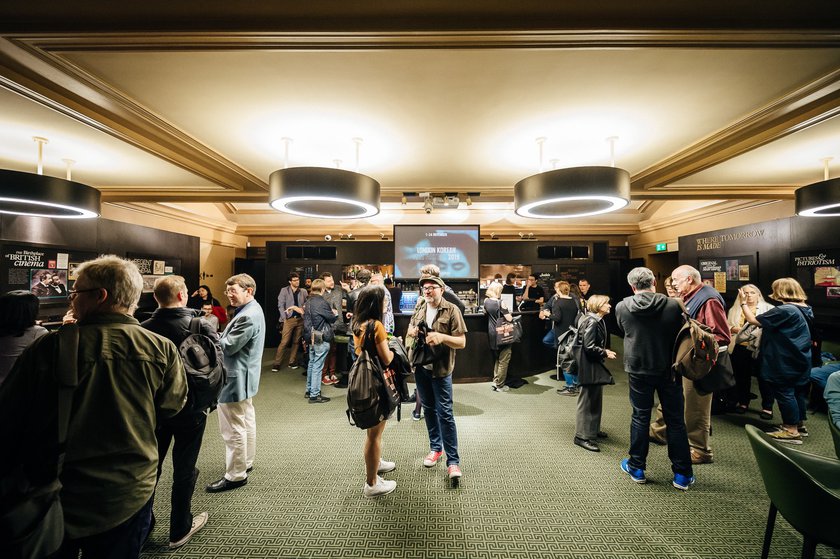Korea on the Big Screen
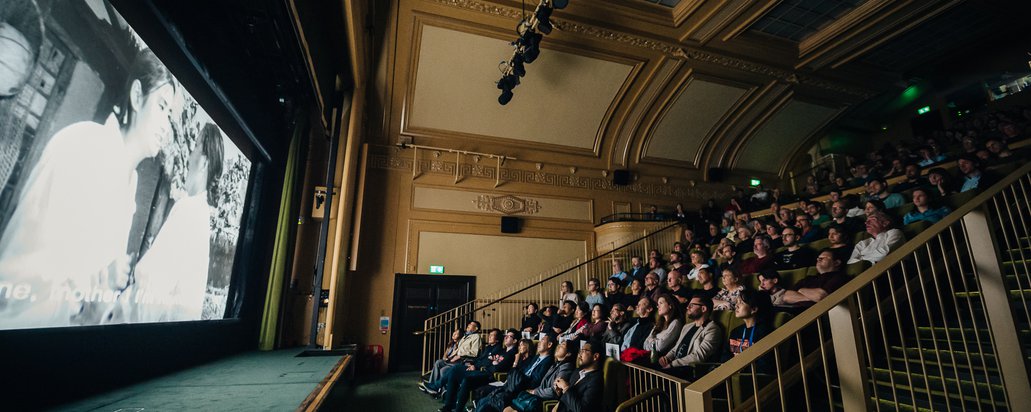
KCCUK Culture Series
This week's instalment in the KCCUK Culture Series introduces Korean cinema as a leading component of the Korean Wave and recommends both classic and current films to watch at home.
Cinema has arguably always been a leading component of the Korean Wave, and in recent years especially films such as Park Chan-wook’s The Handmaiden, Lee Chang-dong’s Burning and of course Bong Joon-ho’s Parasite have placed the Korean film industry under the international spotlight.
The KCCUK has always strived to introduce a diverse range of Korean cinema to UK audiences through our biggest event - the London Korean Film Festival - held every autumn, as well as other programmes throughout the year including our Korean Film Nights and LKFF Teaser Screenings.
In this week’s special feature we introduce the directors leading the K-Cinema Wave, as well as prominent films from the last 100 years of Korean cinema and films to watch in commemoration of the 70th anniversary since the outbreak of the Korean War. We also introduce the leading international film festivals in Korea and recommend some of the latest Korean films available to stream online in the UK.
The Filmmakers Leading the K-Cinema Wave
No doubt if you’ve heard just one Korean filmmaker’s name in 2020, it’s Bong Joon-ho – director of the black comedy thriller Parasite which won four Oscars including Best Picture at this year’s Academy Awards. In his iconic Golden Globes speech, Bong claimed that “Once you overcome the one-inch tall barrier of subtitles, you will be introduced to so many more amazing films.”
The director recommends a variety of both Korean and international films as guest editor of the March 2020 issue of Sight & Sound magazine. And if you haven’t already, we would recommend checking out Bong’s other work including Memories of Murder (2003), The Host (2006), Snowpiercer (2013, recently adapted into a TV series on Netflix), and Okja (2017).
Here is our very concise list of other iconic directors leading the international “wave” of Korean cinema:
- Park Chan-wook has captured the international imagination time and time again with films such as Joint Security Area (2000), Oldboy (2003) and The Handmaiden (2016) – to name a few. More recently Park directed the critically acclaimed BBC drama series The Little Drummer Girl (2018), based on John le Carré’s 1983 novel of the same name and with an all-star cast including Florence Pugh, Alexander Skarsgård and Michael Shannon.
- Lee Chang-dong’s film Peppermint Candy (1999) made waves at the turn of the century and is still celebrated today for its groundbreaking interrogation of the national psyche. More recently, his psychological mystery drama Burning (2018) was nominated for several international awards and won the FIPRESCI International Critics’ Prize at Cannes among other accolades.
- Kim Jee-woon is probably most famous for his psychological horror drama A Tale of Two Sisters (2003) which is the highest-grossing Korean horror film and was the first to be screened in American theatres – leading to an American remake, The Uninvited (2009). Some of the director’s other notable films include A Bittersweet Life (2005), The Good, The Bad, The Weird (2008) and I Saw a Devil (2010).*
- Hong Sangsoo debuted in 1996 with The Day a Pig Fell into the Well, also the feature film debut of Parasite actor Song Kang-ho. Since then the director has enjoyed widespread international acclaim with such films as Right Now, Wrong Then (2015) which won the Golden Leopard, the top prize at the 68th Locarno International Film Festival, and The Woman Who Ran, for which he recently won the Silver Bear for Best Director at the 70th Berlin International Film Festival.
- Bora Kim is a more recently up-and-coming director who turned heads in 2018 with her feature debut House of Hummingbird. The film won major awards at the Busan International Film Festival and was awarded the Grand Prix for Best Film by the Generation 14plus international jury at the Berlin International Film Festival. House of Hummingbird was one of five Korean films on the programme at the BFI London Film Festival 2019.
- Yoon Ga-eun is another female director whose second feature film The House of Us (2019) was screened at the LFF 2019 and who was described by the BFI as “one of the world’s finest filmmakers at capturing contemporary childhood onscreen.” Yoon’s other notable works include Sprout (2013), which won the Crystal Bear for Best Short Film at the Berlin International Film Festival, as well as The World of Us (2015) which earned her Best New Director at the 37th Blue Dragon Film Awards.
A number of these films made it onto the British Film Institute (BFI)’s list of “10 great modern South Korean films” which you can read here for more viewing inspiration.
*Kim Jee-woon's film The Age of Shadows (2016) is currently available to watch for free on BBC iPlayer, for a limited time. Watch the film here.
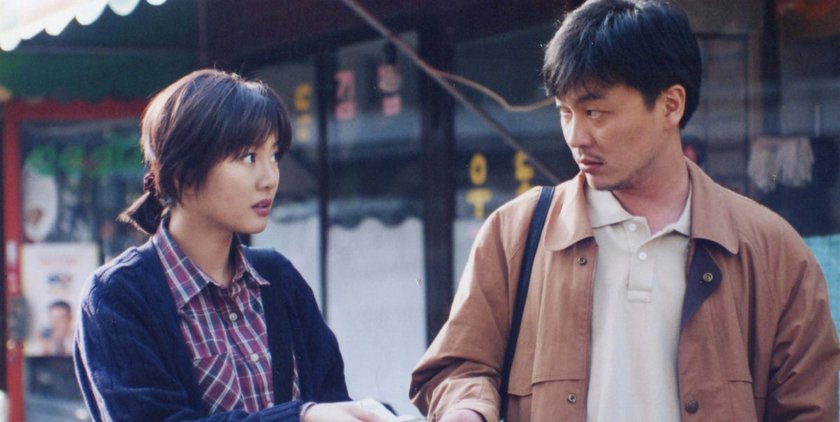
100 Years of Korean Cinema and the Korean Film Archive on YouTube
Last year’s London Korean Film Festival celebrated a century of Korean cinema from 1919 to 2019, honouring this milestone with a unique programme of UK and European premieres showcasing culturally important titles from throughout Korean film history.
However, the best way to learn about Korean film history is arguably by watching the films themselves, so we’ve compiled a list of classic films from the 1930s to the 1990s, many of which were screened at last year’s LKFF and all of which are available to watch with English subtitles on the Korean Film Archive’s classic film YouTube channel. Of course, you should also feel free to browse the channel yourself, as you’ll find a much wider variety of brilliant films than we have space to include on our list.
Discover our classic film recommendations here
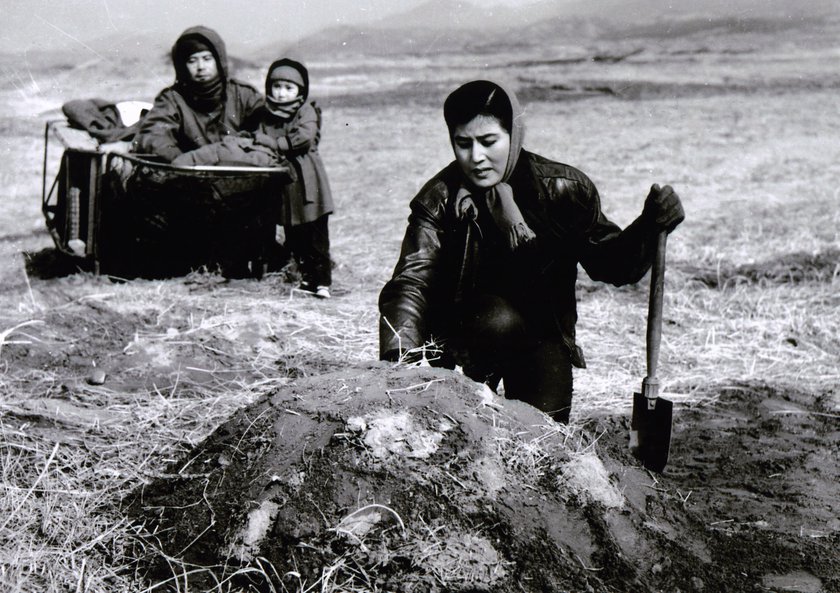
The 70th Anniversary of the Korean War - In Cinema
This year (2020) marks the 70th anniversary of the outbreak of the Korean War (1950-53). Aside from classic titles in our recommendations list such as Piagol (1955) and North Korean Partisan in South Korea (1990), there are numerous other Korean films that deal with the experiences of Korean people during the war and its aftermath.
Our first season of Korean Film Nights this year, ‘On the Front Line’, features a programme of carefully selected titles from South Korea, the US and the UK, each one shedding light on the Korean War as one of the most important events in Korean history and collective memory.
Although the KCCUK screenings have been cancelled due to the outbreak of Covid-19, our new online screening series has made some of these titles available to watch at home on the KCCUK YouTube channel. These include Shin Sang-Ok’s To the Last Day (1960), a melodrama which portrays the struggles and hardships faced by wounded veterans, refugees and war widows. Most recently we have uploaded the beautiful yet disturbing black and white film Jiseul (2012, dir. O Muel), which deals with the massacre of Jeju Islanders during an uprising in 1948-49, just before the Korean War.
The Latest Korean Films to Stream at Home
The Korean Film Archive YouTube channel is the best place to go for classic Korean cinema online. But there are also increasing options for those in the UK looking to watch more recent Korean films at home via popular streaming sites. To help you narrow down the options for your next movie night, we’ve put together another list of our favourites…*
Korean films on Netflix:
- The President’s Barber (2004) - A political dramedy starring award-winning actor Song Kang-ho.
- The Villainess (2017) - In exchange for freedom to live a normal life, a trained assassin begins her 10-year service as a sleeper agent for a government’s secret organisation.
- Okja (2017) - A gentle giant and the girl that raised her are caught in the crossfire between animal activism, corporate greed and scientific ethics.
- Illang: The Wolf Brigade (2018) - In 2029, the elite police squad Illang combats a terrorist group opposing reunification of the two Koreas.
- The Drug King (2018) - A petty smuggler from Busan dives headfirst into illicit drug trafficking in the 1970s.
- Tune in for Love (2019) - A student and a reticent teen first meet at a bakery in the 1990s and try to find each other through the years, as fate keeps pulling them apart.
- Time to Hunt (2020) - Wanting to leave their dystopian world behind for a faraway paradise, three outlaws plot a money heist – and draw the attention of a vicious killer.
Korean films on Amazon Prime:
- The Housemaid (2010) - A remake of Kim Ki-Young’s classic 1960 film of the same name, this stylish psychological thriller tells the tale of how one woman’s influence tears a rich family apart.
- Train to Busan (2016) - As an unidentified virus sweeps the country, those on an express train to Busan must fight for their own survival.
- The Merciless (2017) - While serving in prison, big shot gangster Jae-ho’s life is threatened by a veteran criminal who was dispatched by his own boss.
- The Battleship Island (2018) - Based on true events, this epic historical film follows the plight of Korean labourers forced to mine for coal on Battleship Island during the Japanese colonial era.
Korean films on BFI Player:
- Snowpiercer (2013) - After a global catastrophe launches the world into a new ice age, the last of humanity are trapped on a high-speed train that circles the globe indefinitely.
- A Girl at My Door (2014) - A policewoman becomes protector of an abused teen in a town riven by corruption and alcoholism.
- The Handmaiden (2017) - Park Chan-wook channels Sarah Waters’ 2002 novel Fingersmith, to create a sumptuous twisty psychological thriller full of erotic intrigue.
- The Age of Shadows (2016) - Kim Jee-woon’s stunning, seductive and serpentine action thriller set during Japan’s occupation of Korea.
- Burning (2018) - Lee Chang-dong returns with this spellbinding, richly complex thriller about obsession, class conflict and suppressed male rage.
- Parasite (2019) - Bong Joon-ho’s Oscar-winning box-office sensation is a darkly comic, twisty rollercoaster ride. Parasite is also now available to order on DVD and Blu-ray in the UK and to stream on Curzon Home Cinema.
*Some films may be available to stream on more than one site, depending on your preference. Their availability is also subject to change.
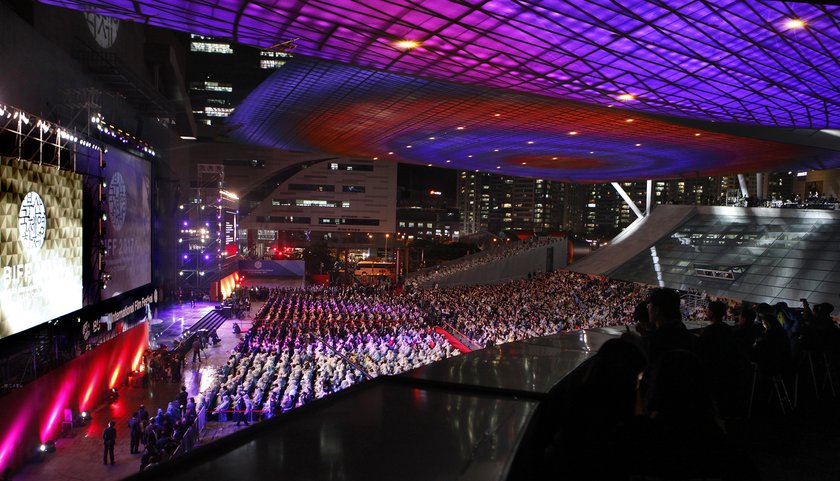
Film Festivals in Korea...
It would be difficult to talk about Korean cinema without mentioning the numerous and diverse film festivals held in Korea each year which showcase the very best in Korean and international filmmaking talent. Three festivals which attract particular attention from global audiences are the Busan International Film Festival, the Jeonju International Film Festival and the Bucheon International Fantastic Film Festival.
The Busan International Film Festival
The Busan International Film Festival was the first film festival in Korea recognised by the International Federation of Film Producers Associations and is held annually in Haeundae, Busan every October. The festival has received much fanfare in Asia and has attracted the attention of film industry professionals all over the world. The festival screens a variety of films including international premieres as well as new experimental films.
The Jeonju International Film Festival
The Jeonju International Film Festival, held in Jeonju, Jeollabuk-do, is a non-competitive competition that still manages to feature a few elements of competition within the categories of international films, Korean films, and Korean short films. Under the slogan of “Freedom, Independence, and Communication,” the festival celebrates low budget independent films and showcases each film with the vision and views of the directors in mind.
Bucheon International Fantastic Film Festival
This is a non-competitive festival with some competitive elements held every year in Bucheon, Gyeonggi-do. The themes of the festival are “Love, Fantasy and Adventure,” with the main focus on fantasy films. Audiences are treated to a variety of genres including horror, action and romance.
Reference: Korea Tourism Organisation
...And Right Here in the UK
Our very own London Korean Film Festival was launched in 2006 and is currently the largest festival dedicated to a national cinema in the world. Held every year in autumn, the festival celebrates the best of contemporary and classic Korean cinema with an exciting mix of UK and international premieres, guests and events across a diverse set of strands including Cinema Now, Women's Voices, Documentary, Hidden Figures, Artist Video, Animation and Mise-en-scène Shorts. Each year the festival kicks off in London before embarking on a tour across the UK with previously-visited cities including Manchester, Bristol, Nottingham, Glasgow, Edinburgh, Belfast and more.
Throughout the year we present regular opportunities to discover Korean film through programmes such as our Korean Film Nights and LKFF Teaser Screenings. As previously mentioned, you can currently enjoy these programmes online via the KCCUK YouTube channel. For more insight into Korean film, we’d recommend checking out the new series of Korean cinema recommendations by leading UK film critics (including Mark Morris, So Mayer, Anton Bitel and Simon Ward) on the LKFF website.
